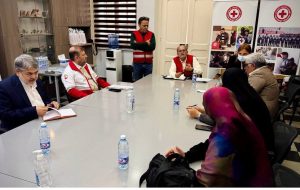Lebanese Red Cross seeks IRCS cooperation to provide aid to war victims
TEHRAN –The secretary general of the Lebanese Red Cross, Georges Kettaneh, has called the Iranian Red Crescent Society (IRCS) to help provide accommodation and medical services to war-affected people in Lebanon following the ceasefire. The secretary general of the IRCS, Meysam Afshar, and the IRCS director for international affairs, Razieh Alishvandi, have paid a visit


TEHRAN –The secretary general of the Lebanese Red Cross, Georges Kettaneh, has called the Iranian Red Crescent Society (IRCS) to help provide accommodation and medical services to war-affected people in Lebanon following the ceasefire.
The secretary general of the IRCS, Meysam Afshar, and the IRCS director for international affairs, Razieh Alishvandi, have paid a visit to Beirut to assess the needs of war-affected people in order to facilitate the provision of humanitarian aid in the region.
“The displaced people have begun returning home after the announcement of the ceasefire, but the health and treatment facilities in Lebanon have been almost destroyed,” The IRCS website quoted Kettaneh as saying.
Referring to the IRCS as one of the top societies in the world, Kettaneh said, “There are no field hospitals in conflict zones, so there is no capacity or infrastructure to address people’s medical needs.
Also, one of our main concerns is that the winter is approaching while many are homeless as 4,600 houses were completely ruined in the war.”
The official went on to say that the tents, manufactured by the IRCS, were extremely useful in sheltering displaced people. “We desperately need these tents to shelter more Lebanese in the future.”
On Wednesday, Afshar and Alishvandi, in a meeting with Cristhian Cortez Cardoza, the IFRC deputy director for emergency response and operations in the Middle East and North Africa (MENA) in Beirut discussed opportunities for enhanced collaboration to address urgent needs and provide relief to war-affected communities.
With the ceasefire now in place, the officials discussed ways to speed up providing aid to the war victims and focused on assessing how they can further support the humanitarian efforts in these critical times.
Lauding the IRCS humanitarian efforts in assisting Lebanese, Cortez asked for boosting cooperation in this regard.
Setting up health centers, providing medical care, as well as making preparations for winter are among the main issues, he noted.
Afshar, for his part, said the IRCS is dedicated to supporting people affected by war or any other disasters worldwide to alleviate their suffering. He went on to say that, “having assessed the needs of war-affected people, the IRCS will do its best to meet their needs.”
Alishvandi, for her part, said the IRCS is ready to dispatch two more humanitarian consignments including essential goods like sanitary and medical items to Lebanon. The official asked the IFRC to further facilitate the delivery of humanitarian aid.
“Iranian Red Crescent is willing to share its experiences and strengthen cooperation with other societies through establishing an international training center,” Alishvandi added.
Since the beginning of Israeli attacks on Lebanon, the IRCS has dispatched 10 consignments of relief items to people affected by Israeli attacks in Palestine and Lebanon.
Lebanese health authorities said Thursday that nearly 4,000 people have been killed in Israeli attacks in Lebanon since last year.
After two full months of uninterrupted Israeli attacks on civilians and Hezbollah forces, a ceasefire came into effect in Lebanon.
The Health Ministry said that 78 people were killed in Israeli attacks on Tuesday, a day before the cease-fire took effect, bringing the overall death toll since last October to 3,961 people.
The ministry added that 266 people were also injured, pushing up the number of injuries to 16,520.
MT/MG
